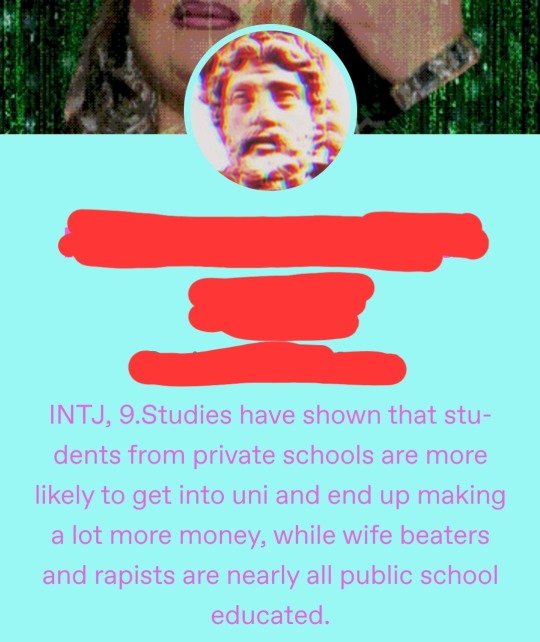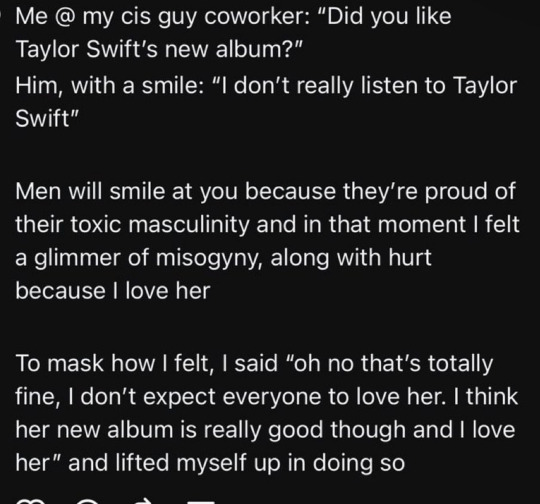Text
32K notes
·
View notes
Text
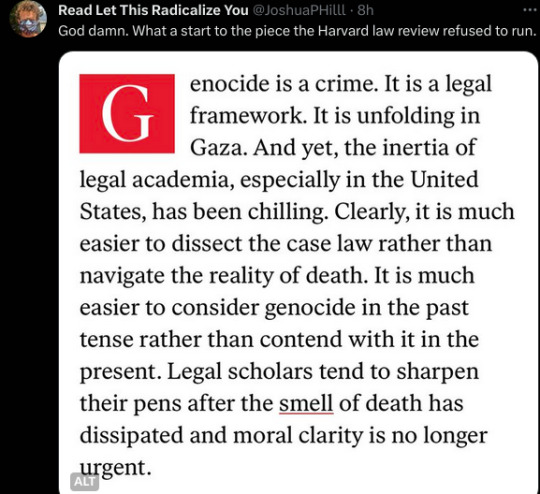
In a statement that was shared with The Nation, a group of 25 HLR editors expressed their concerns about the decision. “At a time when the Law Review was facing a public intimidation and harassment campaign, the journal’s leadership intervened to stop publication,” they wrote. “The body of editors—none of whom are Palestinian—voted to sustain that decision. We are unaware of any other solicited piece that has been revoked by the Law Review in this way. “
When asked for comment, the leadership of the Harvard Law Review referred The Nation to a message posted on the journal’s website. “Like every academic journal, the Harvard Law Review has rigorous editorial processes governing how it solicits, evaluates, and determines when and whether to publish a piece…” the note began. ”Last week, the full body met and deliberated over whether to publish a particular Blog piece that had been solicited by two editors. A substantial majority voted not to proceed with publication.”
Today, The Nation is sharing the piece that the Harvard Law Review refused to run.
Some may claim that the invocation of genocide, especially in Gaza, is fraught. But does one have to wait for a genocide to be successfully completed to name it? This logic contributes to the politics of denial. When it comes to Gaza, there is a sense of moral hypocrisy that undergirds Western epistemological approaches, one which mutes the ability to name the violence inflicted upon Palestinians. But naming injustice is crucial to claiming justice. If the international community takes its crimes seriously, then the discussion about the unfolding genocide in Gaza is not a matter of mere semantics.
The UN Genocide Convention defines the crime of genocide as certain acts “committed with the intent to destroy, in whole or in part, a national, ethnical, racial or religious group, as such.” These acts include “killing members of a protected group” or “causing serious bodily or mental harm” or “deliberately inflicting on the group conditions of life calculated to bring about its physical destruction in whole or in part.”
Numerous statements made by top Israeli politicians affirm their intentions. There is a forming consensus among leading scholars in the field of genocide studies that “these statements could easily be construed as indicating a genocidal intent,” as Omer Bartov, an authority in the field, writes. More importantly, genocide is the material reality of Palestinians in Gaza: an entrapped, displaced, starved, water-deprived population of 2.3 million facing massive bombardments and a carnage in one of the most densely populated areas in the world. Over 11,000 people have already been killed. That is one person out of every 200 people in Gaza. Tens of thousands are injured, and over 45% of homes in Gaza have been destroyed. The United Nations Secretary General said that Gaza is becoming a “graveyard for children,” but a cessation of the carnage—a ceasefire—remains elusive. Israel continues to blatantly violate international law: dropping white phosphorus from the sky, dispersing death in all directions, shedding blood, shelling neighborhoods, striking schools, hospitals, and universities, bombing churches and mosques, wiping out families, and ethnically cleansing an entire region in both callous and systemic manner. What do you call this?
The Center for Constitutional Rights issued a thorough, 44-page, factual and legal analysis, asserting that “there is a plausible and credible case that Israel is committing genocide against the Palestinian population in Gaza.” Raz Segal, a historian of the Holocaust and genocide studies, calls the situation in Gaza “a textbook case of Genocide unfolding in front of our eyes.”
7K notes
·
View notes
Text
Harvard Law School’s student government has labelled Israel’s war on Gaza a genocide, in an open letter demanding the US university divest from Israel.
“Harvard Law School Student Government formally calls upon HMC to divest completely from weapons manufacturers, firms, academic programs, corporations, and all other institutions that aid the ongoing illegal occupation of Palestine and the genocide of Palestinians,” the student body said in an open letter posted on the university website.
The resolution was passed in an anonymous vote of 12 to four, with three abstentions, but has generated some blowback. Two members of the student body, Regina De Nigris and Cameron Adkins, said they strongly disagreed with the decision in a resignation letter, according to The Harvard Crimson.
The open letter makes a historical case for Harvard Management Company’s $50bn endowment to divest from Israel.
Continue Reading
37 notes
·
View notes
Text
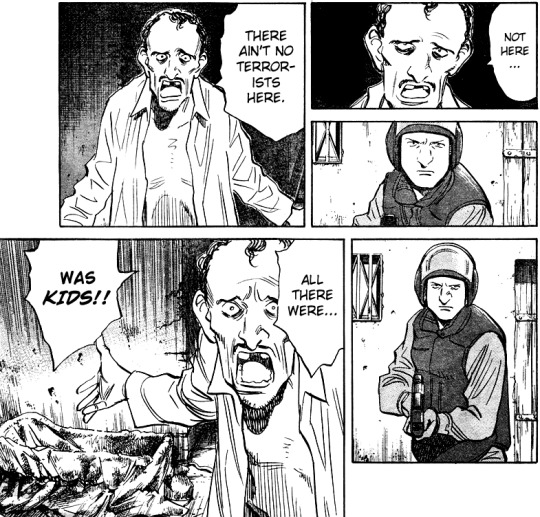
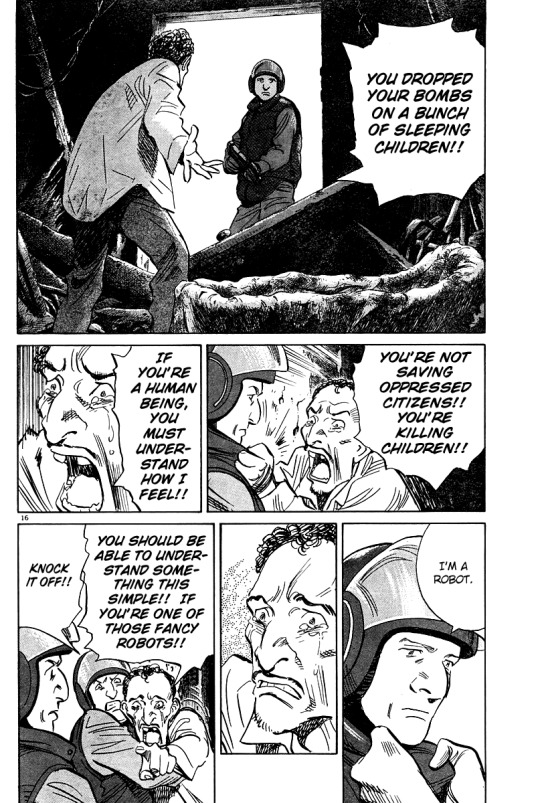
from naoki urasawa’s pluto
while this was a commentary on the american forces in iraq, this feels very relevant still. the use of an elusive mostly imaginary target gives them an excuse to exact violence upon civilian life
24K notes
·
View notes
Text
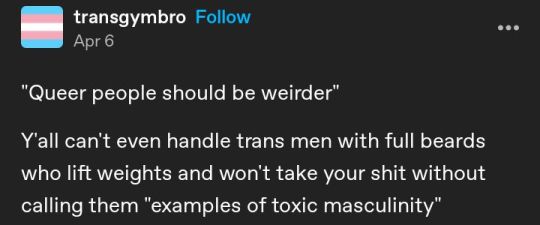
not going to lie i feel like the level to which tumblr is able to handle this is actually quite high
112 notes
·
View notes
Text

this is the best album release of all time because where else are you going to get unironic takes like this and then even get a few hundred people to agree with it
41K notes
·
View notes
Text
i think an uncomfortable truth is that there is an inherent arrogance one has to overcome after spending too much time alone, which is not so obvious when it's forced (i.e. through ostracism) because the assumption is that someone who has been ostracized is more likely to lack confidence and thinks poorly of themselves. but then there's this dance between victimhood and low self-esteem yet also subconsciously believing that your own view or daily decisions are "correct" or "better" because you've never had anyone tell you otherwise, because you've been alone. and in addition have gotten used to being extremely independent and considering others' input doesn't even occur to you. so when others DO provide feedback, it's almost jarring, like you don't have a behavioral pathway with which to respond or receive the feedback so you just respond with irritation because your system is confused
11K notes
·
View notes
Text

cant believe they gave this woman enough money to ruin the environment for singing vapid shit of this caliber for over a decade. have some shame man. get a grip. what the hell are any of you even doing
21K notes
·
View notes
Text
ouran high school host club might be ome of the most misogynistic things ive read or watched and ive literally read ray bradbury and asimov
0 notes
Text
also im doing a critical rewatch of neon genesis evangelion rn would anyone care for me to post takeaways from that
1 note
·
View note
Text
this might surprise you but i am a very unhappy person irl
0 notes
Text
Re-reading Ender’s Game: Racism, blogging and video games
I loved Ender’s Game the first time I read it, as a pre-Internet pre-teen without any knowledge of Orson Scott Card’s bizarre and homophobic vitriol. I even liked the first sequel, before the second one convinced me that maybe some stories were better off as one-shots. Then I found out about Card’s personal beliefs, and mentally classed the book with early Mel Gibson movies and other entertainment I feel vaguely guilty about liking. But as the new, rather-joyless-looking movie adaptation arrived, I decided to reread Ender’s Game, to see how much of what I liked about it remained and how much I could pick up on Card’s prejudices as an adult reader. The short answers: Not as much as I remembered, and more than I expected! First of all…
1) Surprise N-word: Orson Scott Card, would you like some racism to go along with your homophobia? I read an old copy of the book, an early printing that includes a part where, in some routine trash-talking, Ender calls his friend Alai by the n-word, and then jokes about how his great-great-grandfather would have sold Alai’s grandfather to another slaveowner for not liking that term. Kids these days!
“And Shen.”
“That little slanty-eyed butt-wiggler?”
Ender decided that Alai was joking. “Hey, we can’t all be niggers.”
Alai grinned. “My grandpa would’ve killed you for that.”
“My great great grandpa would have sold him first.”
Card edited that exchange in later editions, but apparently not because he’d regretted using the word or even realized that maybe having your white, super-genius, messiah-like hero use racial epithets and joke about slavery isn’t a great way to develop a sympathetic protagonist. No, according to Orson Scott Card, “prudes” forced his hand.
“Even as the old obscenities dealing with sex and excrement were unleashed upon the public, new obscenities moved from the realm of the merely indecorous to the sinful. What f* and s* (and worse words) had once been, now n* has become. And, just as there were prudes who screamed in outrage and demanded that any work containing those old bad words must be banned, so we have a new group of prudes making identical demands about works containing the new bad word,” he wrote in 2000, in response to a question about why he had edited that passage. (Card begins that answer by comparing himself to Shakespeare, which gives you an idea of the rest. He also goes onto to assert that truly sophisticated readers would understand that Ender’s racism was really about teaching Alai tolerance and rebuking his friend for being racist about Asian people – an argument which requires a whole separate critical takedown.)
2) The invention of blogging: Forget the Big Twist. The parts I most remembered from the book over the years, and the parts I was most impressed by, were Card’s prescient depiction of political blogging and the influence that Internet writers would have on world events. Okay, maybe Matt Drudge or Nick Denton haven’t become world dictators, as Ender’s blogger/psychopath brother Peter eventually does. But I was very impressed at how Card, in my memory, predicted the rise and the influence of personality-driven online writers, who become famous based largely on their (carefully-calculated) inflammatory rhetoric. When I went back to reread Ender’s Game, I was most looking forward to spending time with Peter and sister Valentine, who make themselves famous by getting into anonymous online debates with each other.
Unfortunately, it turns out that the Peter/Valentine/blogging plotline takes up about half a chapter, plus a few lines towards the end for plot resolution and sequel setup. I don’t know what it says that throwaway subplots formed my most enduring memories of the book, but it’s not a great recommendation.
3) Video games are about as interesting to read about as they are to watch other people playing. Ender’s Game is a very readable book, which is a big accomplishment considering its reliance on poorly-described virtual combat. The “battle simulations,” first at Ender’s school and later when he’s tricked into destroying the enemy’s homeworld, were pretty opaque to me during this re-read – I finished those scenes with no real visual of what the children gladiators actually accomplished or physically did during the battles. It was much easier to visualize the arenas in the Hunger Games books, for example, or the Quidditch matches in the Harry Potter books. I think Suzanne Collins and J.K. Rowling had a bit of an advantage over Card, in that both of them described battles that were more in the physical world than the video games that make up so much of Ender’s Game. But world-building or big-picture description of any sort isn’t a strength of Card’s – there’s a slapdash civil war shoved into the book’s resolution, between superpowers that have never been clearly delineated. And it’s a problem when you do choose to set a book in what is essentially a series of video game championships and then can’t describe them clearly enough for a reader to do much more than skim for dialogue and outcome.
4) The Big Twist makes no sense. When your main character is a tactical genius, the best strategic mind in generations and the savior of the human race, it rather strains credulity that he can’t figure out when he’s fighting actual battles against an actual enemy. Especially when he’s purportedly hoodwinked by a couple of bumbling mid-level military guys and the washed-up war veteran version of Rip Van Winkle.
3 notes
·
View notes
Photo

Customer: I AM DOING A RESEARCH ON CHIA SEEDS SO I WANT TO PROMOTE IT
DMV: EAT
Verdict: ACCEPTED
1K notes
·
View notes
